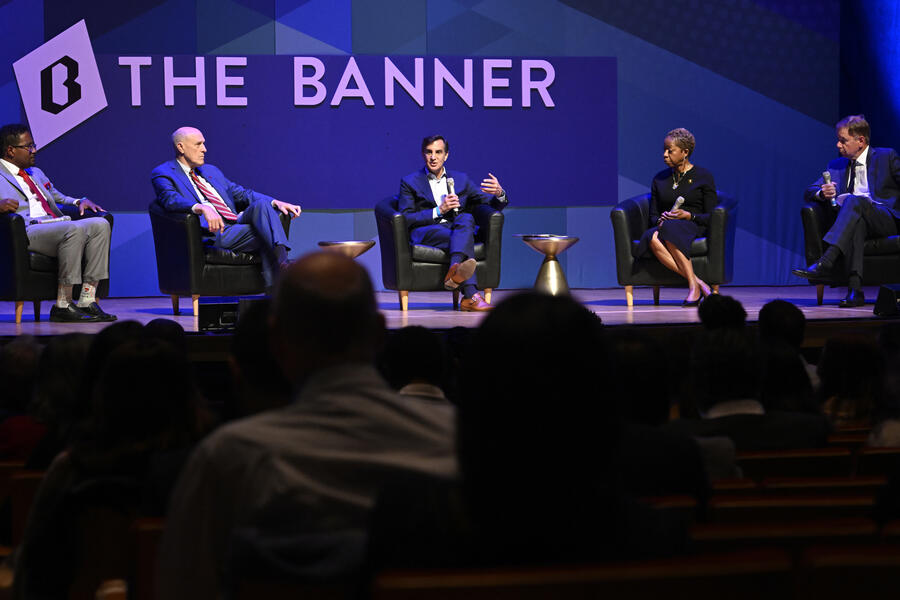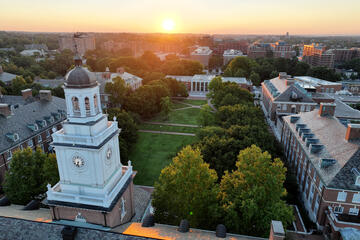- Name
- Doug Donovan
- dougdonovan@jhu.edu
- Office phone
- 443-997-9909
- Cell phone
- 443-462-2947
The third annual Impact Maryland conference, hosted by The Baltimore Banner in partnership with Johns Hopkins brought together influential state, city, and community leaders Tuesday for a day of discussion and collaboration at Baltimore's Joseph Meyerhoff Symphony Hall.
The event featured three panelists from Johns Hopkins University and Medicine: JHU President Ron Daniels; Kevin Sowers, president of the Johns Hopkins Health System and executive vice president of Johns Hopkins Medicine; and Christy Wyskiel, executive director of Johns Hopkins Technology Ventures. The day opened with a conversation with Maryland governor and JHU alum Wes Moore, A&S '01, and a performance by the Peabody Dance Ensemble.
The day's conversations focused heavily on recent changes in the federal government, which have created new challenges for Maryland's universities, health systems, industries, elected officials, and more. The conference also featured discussions on art, affordable housing, and economic growth.
Daniels joined three other presidents of Maryland colleges and universities for a panel titled "The Research Puzzle: Maryland Colleges and the Future of Research" to discuss how their institutions are responding to recent cuts to federal research funding. His fellow panelists were Valerie Sheares Ashby of the University of Maryland, Baltimore County; Bruce E. Jarrell of the University of Maryland, Baltimore City; and Darryll J. Pines of the University of Maryland.
As a leading recipient of federal research grants, Johns Hopkins has been heavily impacted by recent cuts to support for research. But Daniels expressed optimism in the enduring value of research and the many benefits it provides locally, nationally, and globally.
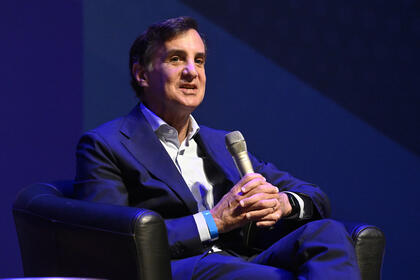
Image caption: Johns Hopkins University President Ron Daniels
Image credit: Will Kirk / Johns Hopkins University
"It's a challenging time, but in truth, if you look at the history of universities in this country, this isn't the first moment when a lot was in play," he said. "And yet, in each of those moments, somehow we found a way to reaffirm our mission and ultimately earn the trust and the support of the American people in a way that's allowed us to do extraordinary things for our students, for our communities, for economic competitiveness, for national defense, for health and public health."
The presidents also discussed how federal research dollars have created a positive ripple effect in Maryland, strengthening the state's economy. As an example, Daniels cited findings from the university's latest economic impact report, published earlier Tuesday.
"In the case of Johns Hopkins, this past year, we are able to demonstrate an economic impact of $4.5 billion just in the city of Baltimore from the federal research funding," he said. "If you go beyond that, one can imagine a doubling of impact across the state of Maryland, and that represents new businesses created, jobs created and sustained. And again, this goes to the magic of ... research-intensive universities like the ones that we all represent, of how we can advance a national interest, but simultaneously be real bulwarks with our own communities and ensure that there are jobs and economic opportunities that are derived from our activities. ... This is a precious asset of this country that must be preserved."
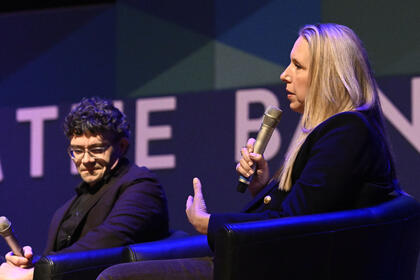
Image caption: Christy Wyskiel, executive director of Johns Hopkins Technology Ventures
Image credit: Will Kirk / Johns Hopkins University
Wyskiel echoed those sentiments in a subsequent conversation titled "Maryland's Metamorphosis," in which panelists discussed how Maryland's medical and biotech research enterprise could turn the state into a startup superpower. Wyskiel emphasized the enormous potential of Baltimore in particular, a city with a long history of industry and innovation.
"What we know is that you can't have a modern urban city thrive without a tech ecosystem," she said. "And we also know that you can't have a thriving tech ecosystem without anchor institutions and partners around it that are really leaning into this work. ... When [JHTV] started this work a little over a decade ago, only 10% of companies coming out of Johns Hopkins were choosing to stay in Maryland. Now 56% of our companies are staying, and they have raised nearly $5 billion in venture capital."
Despite this success, Wyskiel stressed that more could be done with increased state support.
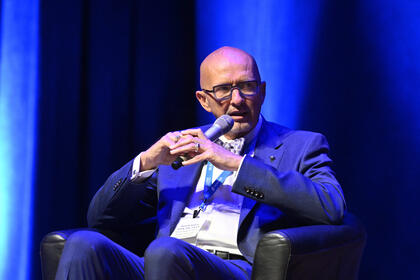
Image caption: Kevin Sowers, president of the Johns Hopkins Health System and executive vice president of Johns Hopkins Medicine
Image credit: Will Kirk / Johns Hopkins University
"Other states have poured in billions of dollars to these ecosystems to create broad swaths of these middle-class jobs," she explained. "This is what is going to turn the city."
Sowers took part in a panel discussion titled "Code Blue," where he and other health leaders described how hospitals are adapting to changing federal policy amidst rising demand. The term "code blue" is used by medical professionals across the country to signal an urgent medical emergency, a situation not unlike what many hospital leaders are experiencing right now—proposed Medicaid cuts, an aging population, and other changes will strain current health systems if leaders fail to adapt, Sowers said.
"As an old nurse, I was taught a long time ago, during the code, you always take your own pulse first," Sowers said. "We are at a moment where we need to take our own pulse first, and the reason I say that is because it's not just Maryland hospitals that are going to be challenged. It's hospitals across the country. ... We have to step back and become even more innovative."
This year, a limited number of free passes to the Impact Maryland event were available to Hopkins affiliates via a partnership with Johns Hopkins University's Sesquicentennial celebration, which marks its 150th year. Solana Postma, a JHU senior studying environmental science, was among those who secured a free pass to the event.
"I'm interested in learning more about different companies and opportunities within Baltimore," she said. "[Impact Maryland] is good way to expand what we're learning in the classroom to what's going on in Maryland."
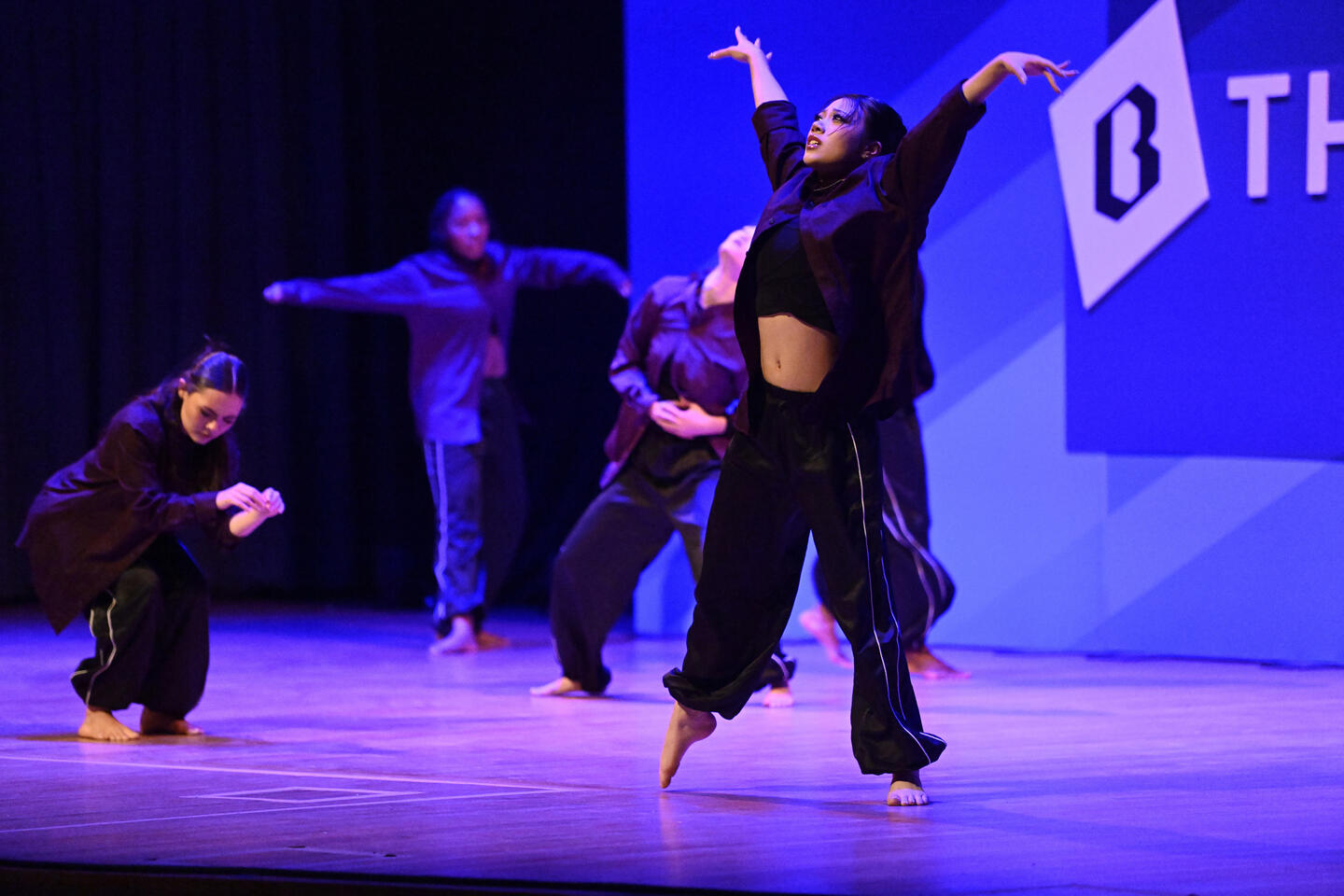
Image caption: Peabody Dance Ensemble, directed by danah bella and Christopher Pennix
Image credit: Will Kirk / Johns Hopkins University
Posted in Science+Technology, Politics+Society




